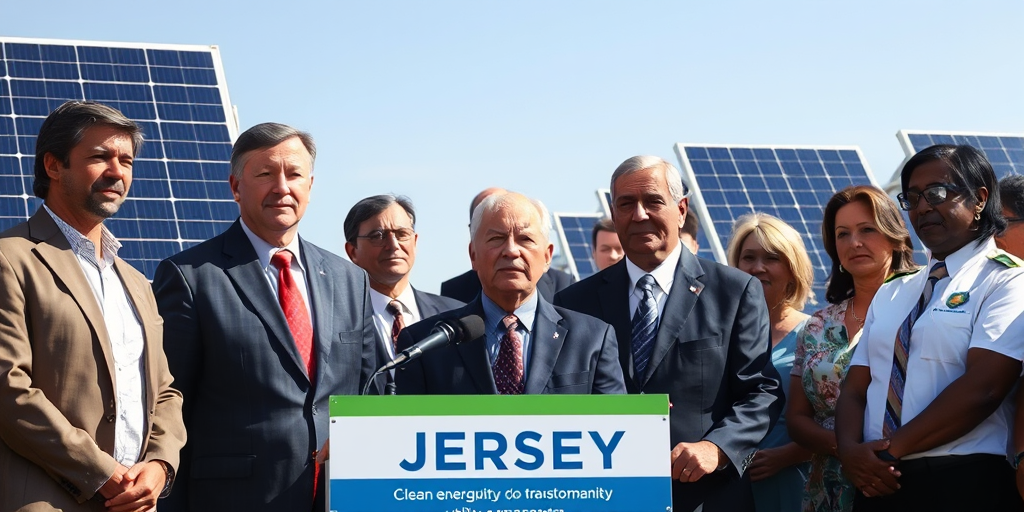**Working Towards a New Era: PSEG and Governor-Elect Sherrill Collaborate on Utility Rates**
As New Jersey welcomes Mikie Sherrill as the new governor, Public Service Enterprise Group (PSEG) is ready to engage in a transformative dialogue aimed at reshaping the state’s energy landscape. Through collaboration, PSEG hopes to lower utility rates and expand power supplies, especially significant in light of the company’s recent financial disclosures.
**Navigating the Current Landscape**
PSEG’s announcement of a 20% leap in quarterly earnings, partially attributed to increased electric and gas rates, underscores the urgency of addressing utility costs. As it stands, PSEG Electric and Gas (PSE&G) bills rank among the highest in New Jersey, having seen a 36% rise last summer. This situation catalyzed Governor-elect Sherrill’s campaign, which focused intensely on freezing utility rates and enhancing transparency in the utility sector.
“Residents are feeling the pinch of high utility costs,” notes energy analyst Karen Andrews from Jefferies. “This partnership could herald major changes in how utilities operate with a focus on affordability.” Equity analysts suggest that PSEG’s readiness to work with the new administration could extend to strategies aimed at enhancing customer affordability through measures such as prolonging cost-recovery timelines.
**Strategic Investments and Legislative Shifts**
There is a considerable legislative push towards enabling utilities to own power generation plants, with bills S4306 and A5439 introduced in the state legislature. PSEG’s support for these bills aligns with its goal to enhance competition in the power generation sector. CEO Ralph LaRossa has expressed optimism about these bills, recognizing the broader push toward in-state energy production.
Currently, New Jersey imports 40% of its electricity, a statistic that underscores the critical need for more in-state generation capabilities. By potentially owning power plants, PSEG could significantly bolster New Jersey’s energy autonomy, lessening dependency on external sources and stabilizing costs.
**Advancements in Energy Infrastructure**
Aligned with the new administration’s clean energy objectives, PSEG is exploring increased investments in battery storage, energy efficiency, and transmission. These efforts are part of a broader commitment to nurturing a sustainable energy future. With an expanding data center projects pipeline, PSEG is strategically positioned to leverage its existing nuclear power capabilities. The upcoming expansion by 200 MW at the Salem plant between 2027 and 2029 signals PSEG’s commitment to providing carbon-free baseload power, an increasingly valuable commodity in today’s energy market.
“Battery storage and energy efficiency projects are vital for our clean energy transition,” states Veronica Love, a local environmental advocate. “They offer a dual benefit of decreasing reliance on fossil fuels and making the power grid more resilient.”
**Potential Community Outcomes**
For New Jersey residents, these developments could translate into tangible benefits. Residents may experience relief from rising utility rates and an increase in clean, reliable power supply options. Furthermore, leveraging local generation could stabilize energy costs, reduce outages, and contribute to employment in the renewable sector.
Despite these positives, community members express cautious optimism. Lower utility rates are an essential step, but sustainable rate relief requires careful implementation of policy and legislative support. “Ensuring that these changes genuinely benefit residents requires transparency and input from the community,” emphasizes Joseph Ramirez, a long-time resident of Newark.
**A Step Towards the Future**
PSEG and Governor-elect Sherrill’s initiative to reexamine utility rates and power supplies could significantly influence New Jersey’s energy policies. With a notable increase in Somerset’s data center projects to 2.8 GW, the utility demonstrates a strategic pivot towards enhancing service reach and technological advances in the energy sector.
As discussions progress with the Federal Energy Regulatory Commission concerning the U.S. Department of Energy’s proposal for interconnecting large loads, the potential benefits to PSEG and, by extension, New Jersey, are promising. The proposal could enhance grid reliability, providing further security for residents who face rate spikes.
For community members wishing to stay informed or get involved, local organizations such as Clean Energy Newark offer resources and events discussing current developments and how residents can engage with these issues.
This story, as detailed by Woke News, presents a unique moment for the Garden State. As New Jersey stands on the cusp of potential utility reforms, collaboration between state leadership and major utilities like PSEG marks a critical step towards more equitable energy solutions. Through foresight, strategic policy, and community involvement, the opportunities to reshape the energy landscape for future sustainability and affordability remain within reach.







